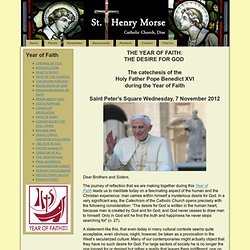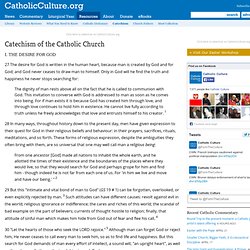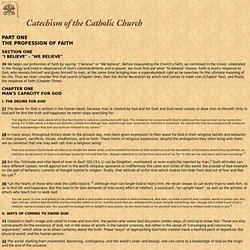

God in all things. ZENIT - The World Seen From Rome. Our Hearts Are Restless Until They Find Their Rest in God | 3948 hits VATICAN CITY, Nov. 7, 2012 (Zenit.org).- Here is a translation of the address Benedict XVI gave today in St.

Peter’s Square. The Holy Father continued his series of catecheses on faith. Dear Brothers and Sisters, The path of reflection that we have undertaken together in this Year of Faith leads us to meditate today on a fascinating aspect of human and Christian experience: man bears within him a mysterious desire for God. Such a statement, which even today in many cultural contexts seems quite acceptable, almost obvious, might instead seem a provocation in secularized Western culture. In my first Encyclical, Deus Caritas Est, I tried to analyze how this dynamism takes place in the experience of human love, an experience that in our age is more easily perceived as a moment of ecstasy, a going out of oneself, a place where man realizes he is permeated by a desire that surpasses him.
[Translation by Peter Waymel] The Desire for God. Dear Brothers and Sisters, The journey of reflection that we are making together during this Year of Faith leads us to meditate today on a fascinating aspect of the human and the Christian experience: man carries within himself a mysterious desire for God.

In a very significant way, the Catechism of the Catholic Church opens precisely with the following consideration: “The desire for God is written in the human heart, because man is created by God and for God; and God never ceases to draw man to himself. Only in God will he find the truth and happiness he never stops searching for” (n. 27). A statement like this, that even today in many cultural contexts seems quite acceptable, even obvious, might, however, be taken as a provocation in the West’s secularized culture. Many of our contemporaries might actually object that they have no such desire for God. A second aspect that goes hand in hand with the preceding one is never to be content with what you have achieved.
The Desire for God is Written in The Human Heart. Catechism of the Catholic Church. 27 The desire for God is written in the human heart, because man is created by God and for God; and God never ceases to draw man to himself.

Only in God will he find the truth and happiness he never stops searching for: The dignity of man rests above all on the fact that he is called to communion with God. This invitation to converse with God is addressed to man as soon as he comes into being. For if man exists it is because God has created him through love, and through love continues to hold him in existence. He cannot live fully according to truth unless he freely acknowledges that love and entrusts himself to his creator. 1 28 In many ways, throughout history down to the present day, men have given expression to their quest for God in their religious beliefs and behaviour: in their prayers, sacrifices, rituals, meditations, and so forth.
You are great, O Lord, and greatly to be praised: great is your power and your wisdom is without measure. Notes: 1 Vatican Council II, GS 19 § 1. Catechism of the Catholic Church - Man's Capacity for God. 26 We begin our profession of faith by saying: "I believe" or "We believe".

Before expounding the Church's faith, as confessed in the Creed, celebrated in the liturgy and lived in observance of God's commandments and in prayer, we must first ask what "to believe" means. Faith is man's response to God, who reveals himself and gives himself to man, at the same time bringing man a superabundant light as he searches for the ultimate meaning of his life. Thus we shall consider first that search (Chapter One), then the divine Revelation by which God comes to meet man (Chapter Two), and finally the response of faith (Chapter Three).
The dignity of man rests above all on the fact that he is called to communion with God. This invitation to converse with God is addressed to man as soon as he comes into being. You are great, O Lord, and greatly to be praised: great is your power and your wisdom is without measure. As St. And St. 44 Man is by nature and vocation a religious being.